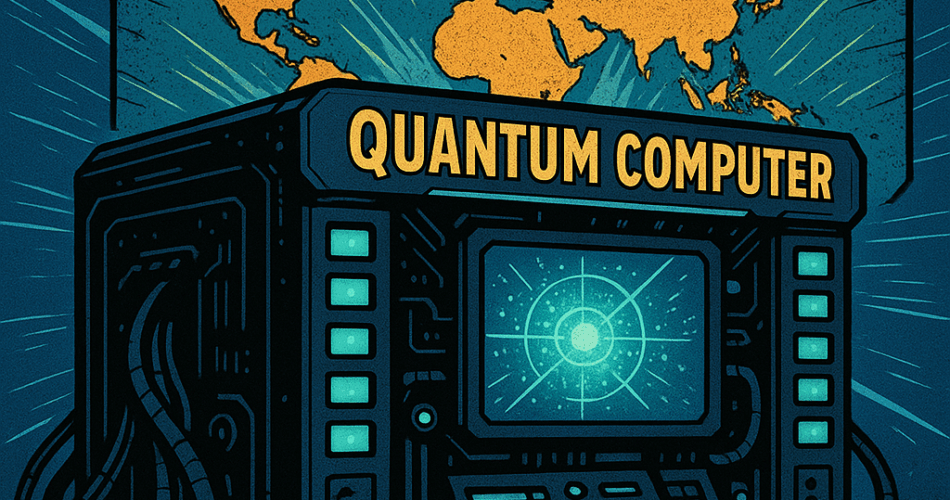Recently, Slavoj Žižek, one of the foremost philosopher and thinker of our time, wrote an article titled “Quantum Physics Needs Philosophy, But Shouldn’t Trust It.” In this article, among other things, he argued that the role of observation is far more complex than merely restricting ourselves to the classical deterministic notion of reality. What he contends not only makes sense but also provides a word of caution about how chaotic things are to become in the future.
Quantum mechanics is weird, non-intuitive, and shatters our existing conceptions of what is real. We are yet to comprehend what it truly is. And to add to this mess, meanwhile, the world has already started talking about quantum computers.
On June 11, 2025, Nvidia’s CEO Jensen Huang, while delivering a keynote in Paris, announced CUDA-Q. For context, CUDA (Compute Unified Device Architecture) is a computing platform and programming model developed by Nvidia in 2006, enabling developers to use GPUs for general-purpose computing, machine learning, and simulations. Similarly, CUDA-Q is an open-source platform for hybrid quantum-classical computing. It would integrate quantum processing units (QPUs) with GPUs and CPUs, enabling application development and accelerating simulations to unimaginable proportions.
To appreciate the importance of the launch of CUDA-Q, it would be profitable to appreciate the brief history of quantum computing, which mostly began in the 1980s when Paul Benioff proposed the world’s first theoretical quantum computer, also known as the quantum Turing Machine. In 1998, the world’s first experimental quantum computer was developed at Oxford and IBM (2 qubits; a qubit, or quantum bit, is the basic unit of information in quantum computing). In 2011, D-Wave released the world’s first 128-qubit quantum computer that was commercially available. In 2019, Google claimed ‘quantum supremacy’ with its 53-qubit Sycamore processor. In 2023, Google demonstrated the world’s first logical qubit. In 2025, Microsoft revealed the Majorana 1 chip, the world’s first quantum chip based on topological architecture. And now, we have CUDA-Q.
Thus, the rate of growth of quantum computing in comparison to classical or graphical computing has been quite slow, to say the least. During the same period, classical computing grew the most but now seems to have hit a peak. Developments in graphical computing gathered pace after the slowdown in classical computing, but now we have started to witness the law of diminishing returns in GPU computing as well. We should consider ourselves fortunate that we still have quantum computing, which is yet to unfold itself—an ace up the sleeve.
In this regard, while delivering the keynote, Jensen Huang made some startling predictions. According to him, quantum computing is reaching an inflection point, and “I could totally expect ten times more logical qubits every 5 years, a hundred times more logical qubits every ten years.” He further boldly claimed that the next generation of supercomputers, every single one of them, will have QPUs (Quantum Processing Units) assigned and connected to GPUs.
This is truly mind-boggling. Today’s computers have just two processing units: CPUs (classical computing) and GPUs (graphical computing). Introducing a third layer of computing in the form of QPUs is going to have profound implications not only for the computing world but also for the rest of the world. We can already run near-accurate simulations to design new molecules and materials. Large Language Models already seem like living brains. Tesla’s robotaxi has already been launched.
With QPUs, these things and processes are going to become exponentially better. Manufacturing and production are on their path to becoming fully automated processes. And if Jensen’s predictions hold true, we should see nice QPUs embedded into each one of our motherboards within the next two decades.
How does this all connect to Slavoj’s point regarding the complexity of the role of observation being far more than the classical deterministic notions of reality? As we know, observation leads to the collapse of the wave function in quantum mechanics. In the same way, observing new technological and political phenomena with different lenses could also collapse some of the potential outcomes. CUDA-Q and the QPUs of the future are surely going to distract the world, at least some of us, from the nonchalant mundane affairs of life as well as from the steps taken by brutal oppressive political regimes and could collapse undesirable outcomes.
Here, it is important for us not to think traditionally. Even Slavoj, in the concluding paragraph of his article, parts by questioning the so-called ‘radical pragmatism’ and the need to keep alive the madness of quantum mechanics and politics.
Such a fresh outlook is immensely necessary to understand what the future might be like. And it is not just Slavoj who is making such calls. Recently, Demis Hassabis, the founder of DeepMind, also stressed that the world needs more philosophers and thinkers to ponder upon the roadmap that may be followed once AGI (artificial general intelligence) comes into existence.
My own understanding is that the world would be flying blind if we do not significantly debate the ontological implications of cutting-edge areas of research like quantum computing and AGI. These upcoming technologies also have the potential to convert the world into a proper dystopia where the haves have everything and the have-nots are stuck with convoluted relics of the past. If politicians are allowed to control these technologies in any manner, it would be akin to giving a monkey a glass of wine, leading to complete catastrophe.
Another frightening reality could be a malevolent AGI. Imagine an AGI utilizing the prowess of a super-powerful quantum computer and just taking unilateral decisions on behalf of the entire humanity. We have seen this all too much in sci-fi movies and books.
But Slavoj’s take on these issues provides a glimmer of hope. The chaotic nature of disruptive technologies is precisely what is driving growth and development in the current society. No doubt these disruptive technologies are also leading to increasing weaponization and warmongering, but in the long run, the net positive of scientific developments should hopefully outweigh the immediate side effects.
Surprisingly, the chaotic nature of politics also seems to be equally important. Many governments and leaders are aching to have the wars they always wanted, and some of the lucky/unlucky ones are having them. The only silver lining in this is that when the dust settles, we, the people, if our eyes are wide open enough, should be able to separate the real grain from the chaff.
My own view is that realist pragmatism has outlived its utility, and disruption in technology and society should continue at an unabated pace in the near future. If things are not chaotic, dirty opportunism shall prevail, and in the name of order/peace, we will be forced to the brink of stagnancy and would perish as a society. The Orwellian nightmares are so real. Let this unpredictable pandemonium prevail, and hopefully, by the end of this century, we should be closer to becoming a Type 1 civilization on the Kardashev scale.

